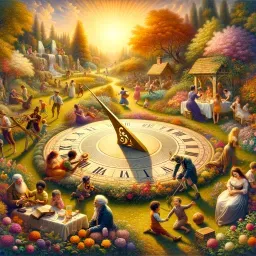All's well that ends well

0
0
0
0
- Meaning
- The phrase means that if the outcome of a situation is good, it justifies any problems or difficulties that were encountered along the way. Essentially, the end result is more important than the process it took to get there. This reflects an optimistic view on dealing with adversities, emphasizing resolution and satisfactory conclusions over the challenges faced during the process.
- Allegory
- The winding, rocky path represents life's challenges and obstacles, while the people struggling and helping each other illustrate the perseverance and support required to overcome difficulties. The bright, warm light at the hill's top signifies the rewarding outcome of reaching one's goals. The transition from stormy clouds to a clear, blue sky symbolizes the transformation and positivity that accompany successful conclusions, embodying the phrase "All's well that ends well."
- Applicability
- In personal life, this phrase can serve as a reminder to stay focused on the overall goal or end result rather than getting bogged down by temporary setbacks. Whether dealing with a challenging project at work, overcoming personal obstacles, or striving to achieve long-term goals like education or fitness, the idea is to keep the bigger picture in mind and trust that the struggles will be worth it if the end is successful and fulfilling.
- Impact
- This phrase has had a lasting impact on literature and common parlance. It encapsulates a fundamental human experience—the relief and satisfaction felt when a difficult situation concludes favorably. It has found its way into various media forms, including literature, film, and everyday conversation, reflecting a collective understanding that success often involves overcoming adversity.
- Historical Context
- The phrase "All's well that ends well" gained prominence in the early 17th century, largely due to Shakespeare's play, believed to have been written between 1604 and 1605. The socio-political climate of Elizabethan England, characterized by exploration, social mobility, and a growing sense of individualism, mirrors the themes of resolution and perseverance reflected in this saying.
- Criticisms
- Some critics might argue that this phrase overly simplifies complex problems by suggesting that a good outcome justifies all preceding struggles. In extreme cases, it may downplay the significance of the hardships faced and the ethical considerations of the means employed to achieve the end. Philosophically, it raises questions about whether the ends always justify the means, a contentious issue in ethical debates.
- Variations
- There are variations and interpretations of this phrase in different cultures. In Japanese, "Hou ga yokereba subeteyoshi" carries a similar meaning, translating to "If the ending is good, everything is good." Such variations reflect a universally shared human sentiment about aiming for positive outcomes.
-

It is better to be alone than in bad company.
-

Nothing will come of nothing.
-

Patience and perseverance have a magical effect before which difficulties disappear and obstacles vanish.
-

How poor are they that have not patience! What wound did ever heal but by degrees?
-

Beauty is in the eye of the beholder.
-

The empty vessel makes the loudest sound.
-

A pound of pluck is worth a ton of luck.
-

Come what come may, time and the hour runs through the roughest day.
-

I can never consent to being dictated to.
-

What a piece of work is a man! How noble in reason, how infinite in faculty!
-

Gather ye rosebuds while ye may.
-

Pleasure and action make the hours seem short.
No Comments